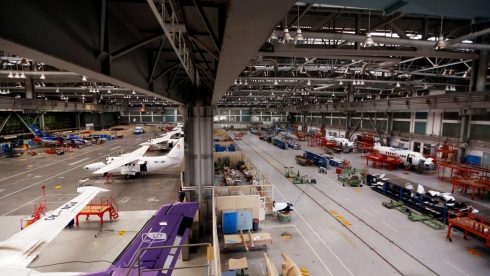DISCLAIMER: this article is older than one year and may not be up to date with recent events or newly available information.
Introduction
Every cloud has a silver lining. Take the Czech Republic, for example. It is currently in the grip of a significant labour crisis, with not enough workers to fill the jobs its public and private sector needs doing. The silver lining of that is it has the lowest unemployment rate of any EU country. However, if it wants to continue to outperform the traditional economic powerhouses of the EU, it needs to find a solution to the labour shortfall.
One way out appears to be technology. Businesses in the country continue to see significant value in automating processes, according to Martin Ježek, business director at Grafton Recruitment, one of Europe’s largest independent recruiters. “Automation and increasing work productivity is currently a significant trend not only in automotive sectors, but also in the field of business services for example, in the shape of robotisation of selected corporate processes.”
It is therefore little wonder that the Republic’s technology sector is seeing record levels of investment, plans to invest over Kč 21 billion (about 90 million USD) in the industry, and the increasing presence of global IT businesses, including
The Czech Republic is a vital part of VMware’s business in the EMEA region, with major customers based locally and seeking ways to drive their businesses forward with technology. There is a wide range of reference companies from big to medium and small size businesses: Prague Stock exchange, University of Pardubice and University of Hradec Kralove, ESET (security SW provider). For example dairy producer Savencia, telco T-Mobile and IT services provider Lundegaard are all aiming to reduce costs, improve performance and become more agile as businesses.
Local footprints with global aspirations
While they may all be based in the Czech Republic, the likes of Savencia and Lundegaard both have international aspirations, while T-Mobile Czech Republic is a subsidiary of German telco giant Deutsche Telekom. With over 20,000 employees and customers operating across the globe, each brand needs IT infrastructure that matches their geographical footprints.
On paper 80-person Lundegaard, Savencia with its workforce of 18,000 plus employees globally in 29 countries, and T-Mobile might be very different operations. In reality, their objectives for their technology infrastructure both covered some of the same key criteria, including cost reduction, simplified management and improved agility
To help them achieve this, each company worked with VMware’s local team and its partners to deliver technology specific to their needs.
Different industries, common purpose
For T-Mobile, using VMware vSAN led to shifting infrastructure to low-cost, high-volume server economics, and simplifying management with one integrated software stack. This meant it was able to reduce rack space, hardware power consumption and administration costs. Václav Molík, head of customer solutions design at T-Mobile Czech Republic said “vSAN enabled the seamless extension of virtualization to storage, creating a hyper-converged solution that works with our existing tools, skillsets, software solutions and hardware platforms.”
Savencia wanted to be able to manage all its technology, whether in its production facilities across the Czech Republic and Slovakia or in its Prague headquarters, using one hyper-converged infrastructure. It used VMware vSphere virtualisation and VMware vSAN virtualised storage to ensure high availability for production servers, eliminate local infrastructure maintenance costs and to streamline IT operations with a centralised single-screen management. “The VMware vSphere 6.5 and VMware vSAN 6.6 technology has helped us streamline IT operations. We are now able to manage the entire IT environment as a single unit from a common interface at our Prague headquarters,” Vladimír Drápalík, Savencia’s Czech Republic and Slovakia IT manager said.
Using three virtualised data centres based on VMware products (VMware vCloud Director, VMware vSphere 6.5 and VMware NSX), Lundegaard was able to scale its resources according to customer requirements and market situation, which is crucial when its workload and capacity requirements fluctuate depending on current projects. This simply was not possible with the legacy infrastructure. “With vSphere 6.5 virtualization versus running physical servers, we enjoy greater flexibility in creating dedicated server environments including on-demand scaling up or down as the customers’ real needs evolve over time,” says Tomáš Zajíček, CTO, Lundegaard.
“Ambitious and well-established businesses are looking for agile, cost-effective infrastructure that meets the demands of today’s market,” said Eliska Jirovska, Country manager for VMware Czech Republic and Slovakia. “These three businesses operate in different sectors, yet they have common ground in how they are deploying technology – as a business critical, strategic asset.”
Digital working to digital businesses
T-Mobile also called on VMware when it needed to deploy a digital workspace for improved effectiveness. As it expanded, the company faced increasing demands for access to corporate data from various locations. Mobile employees, using a variety of devices, were putting pressure on the IT department to keep improving their services and provide better access to the corporate network.
Using VMware Horizon as part of a digital workspace strategy, T-Mobile was able to balance the demands of its workforce with the need to maintain security and control, with a single platform that allowed for both remote and onsite working. More employees now have the freedom to work remotely, benefiting from the flexibility, convenience and increased productivity.
Managing the demands of dynamic markets with digital operations
T-Mobile, Savencia and Lundegaard are prime examples of how locally-based businesses are tackling the demands of dynamic markets by digitising their operations to deliver the next stage of their growth.
They’re also examples of how VMware supports its customers in a variety of ways.
“Our global reach means we can draw on a huge cross-section of expertise, both inside the company and through our partners on the ground,” explained Eliska. “The breadth of our offering means we aren’t just stuck offering one solution. We can support our customers across their whole technology infrastructure, helping keep something that can be incredibly complex as simple as possible, without restricting their choice of solution.”
To find out more about VMware in Czech Republic, or to speak to someone about working with us, please fill in a contact form here or call: +420 255 725 410
Category: News & Highlights, Success Stories
Tags: automation, Czech Republic, work productivity





No comments yet